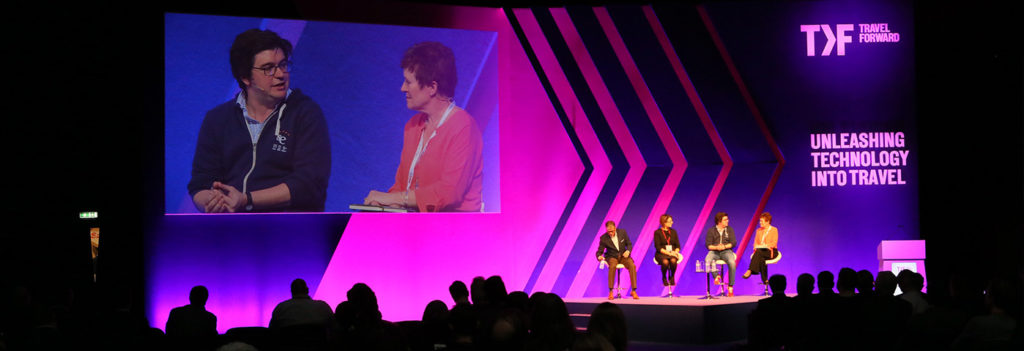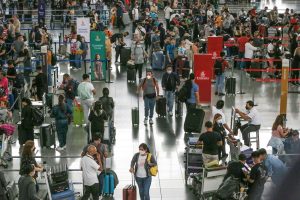Travel technology is not only responding to some of the changes in traveller behaviour but also driving some of those changes, according to experts speaking on the opening day of Travel Forward.
Travel Forward is the exciting new event co-located with WTM London, launched to inspire the travel and hospitality industry with the next generation of technology
Mike Croucher, Head of Technical Strategy and Chief Architect for Travelport, opened the event with a presentation explaining how the travel industry was forcing consumers to behave in a way which suits travel industry systems, rather than reflecting how and what they want to buy.
He argued that the backbone of the industry has traditionally been “systems of record”, and that today’s consumers expect be serviced by “systems of intelligence and systems of engagement”.
“Systems of intelligence” are new ways to connect supply and demand, and have artificial intelligence capabilities integrated in the platform. He referenced Hopper, the US-based recent recipient of a $100 million funding round. Hopper has developed algorithms which track historic flights pricing data and advices cost-conscious travellers on “the best time to buy”.
“It is reverse engineering the revenue management systems of airlines,” he said.
“Systems of engagement” is about channels. Instagram was the point of reference, with Croucher saying “70% of the content on Instagram is travel-related”. Travelport and easyJet have jointly developed a way to connect images on Instagram with easyJet’s booking engine.
“Why come out of the channel you are in?” he suggested.
Croucher’s angle that the industry is “designed around silo-ed processes and not the customer” was repeated later in the day by Olaf Slater, Senior Director International Strategy & Innovation, Sabre Hospitality. He talked about “history…hindering a great customer experience”.
He plotted the order of the hotel industry’s engagement with guests as “rates, room, amenities, destination and experience”. He believes that, Millennials in particular, would expect the conversation to begin with the experience that the hotel can offer.
Millennials were a recurring theme throughout the day. Dr. Kris Naudts, founder & CEO of Culture Trip, talked about the dominance of that generation within its 300-or-so staff members. He said that Millennials were a positive force and their presence was creating a positive workspace for all staff, irrespective of age.
But a more prevalent theme was artificial intelligence and machine learning, two phrases which are rapidly becoming interchangeable. Finnbar Cornwall, Industry Head – Travel, Google, kicked off his presentation with a quotation from Google CEO Sundar Pichai:
“Machine learning is a core, transformative way by which we’re rethinking how we’re doing everything. We are thoughtfully applying it across all our products.”
Cornwall’s presentation explained how the search giant was embedding AI at the production level into a number of Google products and services, and that many of the automated features of its Ad product portfolio were powered by AI.
His session referenced Google’s AI business Deep Mind, which learnt how to play the world’s most complicated game – Go – and ended up beating the world champion. Cornwall said that the number of possible moves within a game of Go was comparable with “the number of atoms in the universe.”
In a travel context, he argued that the permutations – moments, messages, feeds, formats and bids – was relatively modest and “AI and ML could get us closer to every marketers dream of achieving relevance at scale”.
Elsewhere, blockchain was explained to the audience by Dave Montali, CIO, Winding Tree
a not-for-profit Swiss organisation developing a blockchain-powered decentralized travel ecosystem. Blockchain, he said, is a database which can do the work of a GDS or bedbank but without the costs, although there are different costs when running a blockchain.
He also talked about the ability of blockchain to integrate with legacy systems or other technologies.
The integratability of blockchain tapped into another recurring theme of the day – partnerships. Tim Hentschel, CEO of group booking technology specialist HotelPlanner, said that any business with a strong technology or supply proposition would find similar businesses willing to work with them. “The idea is to make inventory as consumable by as many people as possible,” he said.
Virtual, artificial and mixed reality were also present throughout the day. Dr Ashok Maharaj, XR Lab, Tata Consultancy Services, shared some insights into how this part of the tech landscape is evolving. He admitted that the technology is currently “clunky” but is confident this will change. “The first mobile phones to have GPS needed an antenna. Now it is built in,” he said.
One trend which Expedia is particularly attuned to is the impatience of the modern-day traveller. Hari Nair, Global Senior Vice President at Expedia Group Media Solutions, said that the business was “pivoting to an infrastructure” which loads a page within two seconds. The reason, quite simply, is that if a web page takes longer to load, conversion rates drop immediately.
Jon Collins, Programme and Content Director, Travel Forward said; “The very first day of the very first Travel Forward captured exactly what we wanted – intelligent business-critical conversations from travel brands and suppliers, presented to an engaged audience. We are confident that every attendee came away with actionable insights to help drive their travel business forward.







